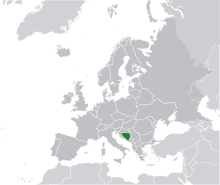LGBTQ rights in Bosnia and Herzegovina | |
|---|---|
 Location of Bosnia and Herzegovina (green) | |
| Status | Legal since 1858 when part of the Ottoman Empire, criminalized upon incorpotation into the Austria-Hungary in 1878, made legal again in 2003 |
| Gender identity | Transgender people allowed to change gender; surgery is required |
| Military | Gays, lesbians and bisexuals allowed to serve |
| Discrimination protections | Sexual orientation, gender identity and intersex status protections (see below) |
| Family rights | |
| Recognition of relationships | No recognition of same-sex relationships |
| Adoption | – |
Lesbian, gay, bisexual, and transgender (LGBT) people in Bosnia and Herzegovina may face legal challenges not experienced by non-LGBT residents. Both male and female forms of same-sex sexual activity are legal in Bosnia and Herzegovina. However, households headed by same-sex couples are not eligible for the same legal protections available to opposite-sex couples.
Bosnia and Herzegovina is a secular country composed of mainly Muslims and Christians (Catholic and Orthodox). While officially secular, religion plays an important role in Bosnian society. As such, attitudes towards members of the LGBT community tend to be quite conservative.[1] Some LGBT events, most notably the Queer Sarajevo Festival 2008, have ended in violence, when "a combination of football fans and religious extremists" stormed the festival while shouting death threats and religious phrases. According to a 2015 survey, 51% of LGBT Bosnians and Herzegovinians reported some form of discrimination directed against them, including verbal abuse, harassment, and physical violence.[2]
Nevertheless, attitudes are changing. In 2016, the government of Bosnia and Herzegovina approved a comprehensive anti-discrimination law, banning discrimination on account of one's sexual orientation, gender identity and sex characteristics. More and more gay bars and venues have opened, especially in the capital city of Sarajevo.[1] Bosnia and Herzegovina's desire to join the European Union has also played an important role in the Government's approach to LGBT rights.[3] The association ILGA-Europe has ranked Bosnia and Herzegovina 22 out of the 49 countries in the Council of Europe in terms of LGBT rights legislation.[4]
- ^ a b Bedford, Sam (6 December 2017). "What's it Like to Be LGBT in Bosnia?". Culture Trip.
- ^ "Gays in Bosnia still living life in the closet | DW | 27.10.2016". Deutsche Welle.
- ^ Cite error: The named reference
erawas invoked but never defined (see the help page). - ^ Cite error: The named reference
rainbowwas invoked but never defined (see the help page).